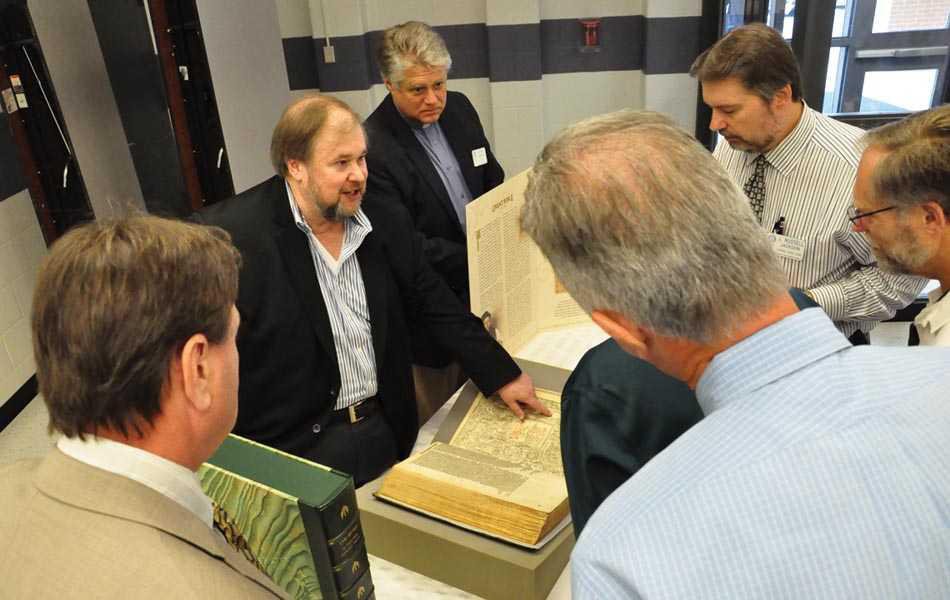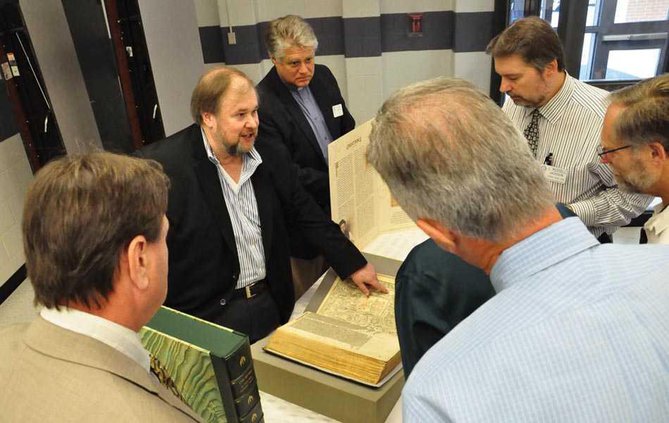When longtime Forsyth County resident Charles Payette purchased a rare bible 15 years ago, he had no idea how quickly his collection would evolve and grow.
That first acquisition — a 1602 Bishops’ Bible — sparked an interest in learning all he possibly could about the history of the English Bible, the Protestant Reformation and the history that in many ways has shaped the English language and the world.
Today, Payette’s collection — numbering more than 3,000 Bibles, wood blocks and other rare artifacts — is considered one of the world’s finest and rarest in private hands. In fact, some books in his collection are the only known ones in existence.
The two qualities all of Payette’s treasures have in common: They’re in pristine condition and extremely rare.
“I’ve always been a lover of truth,” he said. “What started as a hobby, grew into such a passion. I feel as if I am the caretaker of these rare and amazing treasures.”
Payette’s successful 35-year career in the medical and insurance industries has afforded him the ability to amass such a formidable collection.
“It started as a hobby, but quickly grew into a passion,” he said.
And as it did, Payette began wondering why he was the one being entrusted with them and what he should do.
“There is no museum in the entire world that is dedicated solely to the English Bible and the Protestant Reformation,” Payette said. “I began thinking, there is the Vatican in Rome, the British Museum in London, and a vault in Cumming, Georgia. Why couldn’t there be a museum here to share my collection with the world?”
Payette said it would be an amazing opportunity for people to learn about and see this history in person, rather than just read about it and see photographs in books.
“I would want the experience to be very interactive,” he said.
A 21-year resident of Forsyth who has lived in Georgia for four decades, Payette said he has thought long and hard about where the proper home for his collection should be. He is in talks with a local state university, several investors and two other museums.
“I thought about three or four places in the country, and then I thought, why not Cumming,” he said.
Why not, indeed? Atlanta was recently voted the fourth most visited city in America, outranking Los Angeles, San Francisco, Las Vegas and Miami. Some 42 million people flock to Georgia, and Atlanta in particular, from all over the world to see attractions such as the Georgia Aquarium, Martin Luther King Junior Center, the World of Coca Cola, etc.
People of all religions and certainly scholars and students of the Bible would surely make the short pilgrimage to Cumming to view a rare collection of Bibles.
At least one person already has — and from Pennsylvania.
“I moved [to Georgia], to a large degree, to be able to put my knowledge alongside Charles’ resources,” said Andrew Gabriel Roth, a Bible translator, historical researcher and author.
While the world may not yet be familiar with the magnitude of Payette’s collection, the same can’t be said for Roth and a select number of other scholars.
“It is truly unprecedented the works Charles has, especially when you consider their pristine condition,” Roth said. “I feel I’ve been training for this my entire life.”
Payette, himself a walking encyclopedia of history, explained that the period between 1500 and 1600 was the first major period of Bible translation in the English language and the formation of numerous Protestant church denominations.
In the early 16th century, scholar and theologian William Tyndale was the first man to translate the Bible into English from the original Greek, Hebrew, and Aramaic. A genius who spoke eight languages, Tyndale often is called the “architect of the English language.”
Payette owns several pristine Tyndale Bibles, including the 1537 Matthews Bible. Considered by many to be the first true complete English Bible, it was completed just one year after his execution.
“Regardless of your religious affiliation, everybody should be interested in the Bible since our language is based on it and our country was founded when the Puritans fled to read it,” Payette said.
According to Roth, the scholar and author, the Tyndale Bible is as important to Christianity as the discovery of the Dead Sea Scrolls is to Judaism. He is currently writing a book about it and its influence on history.
“I can talk about Tyndale’s Bible, but Charles has it,” Roth said. “Many things in his collection are said to not even exist. I know because I have researched them and then have seen them in this collection.”
Payette’s vast collection also features Bibles of every significant aspect of the Reformation, including one of the finest first edition King James Bibles in private hands.
While every Bible has a story, some have many. Everything in Payette’s collection is well documented as far as known history, including who owned it.
The collection includes: the personal bible of Christopher Jones, the captain of the Mayflower; Francis Walsingham, the “Spymaster;” and numerous kings and queens of the legendary Tudor family.
Payette recently spoke to the Rotary Club of Forsyth County, sharing with members a brief history of the English Bible and showing several of his acquisitions.
Rotary President George Pirkle said the Bibles were impressive and the members were captivated with Payette’s words.
Pirkle noted that while having a speaker on such a topic may be somewhat unusual for the small group, Payette’s words and the subject matter certainly resonated.
“We were all amazed and as soon as he finished speaking, there was an immediate crowd of people looking at the Bibles he brought with him,” said Pirkle, adding that he hopes Payette does decide to open a museum in Forsyth.
“It would be fantastic if something like that was here. It would really put Cumming on the map.”
According to Payette, the support of the local community, private parties, churches, schools and state sponsors will be critical to keeping his priceless collection in Forsyth County.

